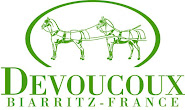Q. Where are you from originally?
A. I grew up in central PA and went to college at Dickinson in central Pennsylvania; that’s where I started out. I based my professional career in Middleburg before moving it to Aiken two and a half years ago.

photo by Emily Daily
Q. How did you get involved in eventing?
A. Well, I always wanted to be a cowboy! But there are no cowboys in central Pennsylvania so I got involved in pony club. I watched Radnor and I thought that was the coolest thing-- I want to do that. When I was a Young Rider I got hooked up with Wash Bishop, he was the hot shot young riders coach at the time. Wash was the first person who made me feel like I could really be a professional and make a living. It’s all his fault.
Like everyone I sort of kept going. I’d go to Florida for the spring semester. I was never really interested in going to college or being anything other than horseman. My father was close to Dickinson and I could keep horses there. Also, the Dean had a daughter who rode so she understood leaving for a semester and that kind of thing. It’s her fault too.

Q. Do you have a favorite horse?
A. Well, I like all of them, that’s what keeps us doing it. There have been lots of good horses for me, and horses I learned from. Orion, who I took to Fair Hill CCI*** the past few years, is quite a good horse. I’ve had him since he was three. He and I are probably best friends. You can’t train a horse that long and not like them. He’s ten or eleven. He’s a bad mo’ fo’. He’s as intelligent a horse as I’ve ever trained with an eye that’s a little bit of a mad scientist. He’s always thinking and contemplating his next move. To grab a dog by the scruff of the neck, he’d love to do that. A dog, a small child. We have automatically waterers and we had to take his apart since he kept dismantling it. He’s a little bit like me as a mechanic: he can take it apart but doesn’t put it back together. He won’t be sound enough to keep as an upper-level eventer so I’ll take him over timber or into the hunter ring. That’s good for an eventer—brave enough for timber and nice enough for the hunter ring.
Q. Are you in a relationship?
A. My girlfriend and I have been together for four years and live together and run the business. She’s competed through the 2-star level and thinks of it as hobby. She won’t ride if it’s hot, cold out, or early in the morning. She’s way smarter than me.

photo by Emily Daily
Q. What about eventing makes you get up every day and do it again?
A. I would say the big picture is that I like to do lots of things whether its horses or outside of horses. [With horses] the quality of life is high. I ride horses on a beautiful farm and green grass and blue sky. If I had to do dressage every day I’d go insane. Riding cross-country is great, great fun. There are very few event riders who would say they do it for the dressage.
Q. What made you make the move from Middleburg to Aiken?
A. I had been coming [to South Carolina] for the winters for a long time and I’d get back to Virginia in April and it would still be winter. In 2006 I bought a house before moving back. The area is not unlike Ocala or Southern Pines— it’s seasonal and a great place to train horses. Last year we went North for the summer, a reverse migration. This year we decided to stay here. We own a farm, Shadow Lane Farm, here which I couldn’t do in Middleburg.

Q. What words would you use to describe your farm in Aiken?
A. Depends on the time of year. This time of year it’s quiet and peaceful. In the winter it’s bustling and overwhelming. This winter we hosted, for the second year, the Aiken Event Horse Sale, a bit of an experiment. We modeled it on the Aiken polo pony sales. We

hosted four clinics with Jules Anderson (known best for training Julie Richards, who went to 2000 and 2004 Olympics) and Natalie Bouckaert (now Pollard). We had an eventing camp, which was fun and hosted a couple ICP workshops (Instructor Certification Program). I’m a big believer in that you always have to be getting better. If you’re not improving you’re slacking off. By the time April 1st rolled around we were pretty frazzled. This time of year it’s sleepy and quiet and pretty nice. A farm always has to look for ways to make money and be useful. A farm always needs to be doing something.

My project at the moment is to raise 300 turkeys for Native Meats. It’s local, pasture-raised meats sold in South Carolina. The idea is to create a local food economy. I spend twenty years learning about horses, now I’m learning about turkeys! You’d think 300 turkeys would make a racquet but they’re pretty low-key. The horses don’t know what to think but they don’t seem to be worried. Farms used to do so much more, now they only do one thing. The time I spent going to England there were plenty of yards that were just eventers, but lots were also agricultural.

Above: Craig farming those turkeys!
Q. How would your students describe you?
A. Just like my horses: A bad mo’ fo’. I don’t know, I enjoy teaching and I try to get feedback from my students. One of the things that’s underrated is too much emphasis on 45 minutes in a riding ring. There’s not enough emphasis on the beginning, which is a calm horse. And before we get that we need a calm rider. It’s hard to think about a canter departure if you’re nervous. When you’re calm you can. I teach the mental game which is so successful. I try to talk about it because riders and students need to be aware that every top rider has had to develop a better mental game. Working on our mental game is free. You can work on it in bed at night or driving down the road. There will always be someone with a nicer horse, or one who’s faster to the jumps, but not someone who has a better mental game. I would hope they say I teach not just riding but also calm and relaxation. I hope they would say I teach it’s okay to make mistakes. The fear of mistakes is crippling. You’re better off making that new mistake than repeating the same old mistakes. It’s hard to get out and be brave enough to be wrong. That’s how we get better. And they would say I’m stunningly handsome and cool.

Q. How did you get involved in cross-country course building?
A. Well, I’ve always liked power tool and chainsaws and tractors. I got into course building with Morgan Rowsel, who builds the
courses at Jersey Fresh and helped him with a bunch of courses. When I started the Surefire Horse Trials I built pretty much everything myself with a bit of Morgan's help , same thing the second year when we added Beginner Novice and Intermediate. It’s a good way to spend a day. Building and designing [courses] go hand in hand. You have to have some clues on how to set up an exercise, which gives us clues on how to ride. Tremain Cooper, who designs Morven and Poplar among other courses, and I worked together. He helped me think about course design and that’s a good thing to have in a tool chest. You have a better opportunity to understand an exercise. Though course designers, like riders, have to be prepared to be wrong. Mostly it’s just something I play with at home.
Q. What about event organizing?
A. I started Surefire and Maryland Horse Trials from nothing, from the farm land. I did feel like as a rider I knew how I wanted it to run. I enjoyed it at the time don’t miss it a lick. Starting an event from scratch is incredibly time consuming, I would do it again if we owned enough land; I would want to do something unique and special. Like a $100,000 Advanced invitational.
Q. How do you do it all?!
A. Don’t take any of it or yourself too seriously. How’s that? That’s the answer.
Check back soon for Craig Thompson Part II:
What do Advanced eventers and cats have in common? Find out at Three Days Three Ways!


















